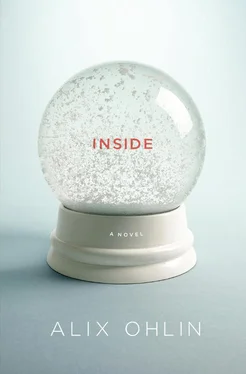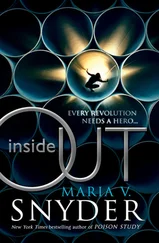This time was different, the city colder and drabber than she remembered, void of the color that gave every day in California a sense of health and possibility. She was in town for some meetings and a magazine photo shoot, but she had a few hours to kill. Leaving her Midtown hotel, she walked south in a daze, not planning her route, trying only to avoid the worst of the crowds. She had always liked the big department stores on Fifth Avenue; they reminded her of old movies and the wholesome glamour of an easier time. Gradually she moved east, then south, past Union Square, not even tracking how many blocks she’d walked, and then she looked up and realized that she was staring at the windows of her old apartment.
Had she really allowed a grubby teenage runaway and her pimply, construction-worker boyfriend to live in her apartment and sleep in her bed? It felt like someone else’s life.
People were walking in and out of the building, all strangers, not a single one of the old ladies who’d once clustered there. Maybe the landlord had succeeded in replacing them all with higher-paying tenants, or had sold the building. There was no movement in the windows of her apartment. There was nothing to see.
The day was brisk, winter skidding leaves off trees, and she wasn’t dressed warmly enough. She wrapped her sweater around herself and walked on. Down the block, a baby was wailing miserably, and she saw the mother pushing a stroller toward her. For moment, she had the insane thought that it was Hilary; but this woman was older and looked wealthy, bundled in a cashmere scarf, her long hair a cascade of glossy curls. The baby had a big round head that rolled from side to side. The wind had whipped his cheeks to a rosy red, like children in old picture books. Jowly and fat, with a cascade of chins, he was a little clown in a big white suit. As they passed Anne, the baby stopped crying and stared at her, and she looked back into his bright blue eyes.
Farther down the block, he started crying again, and the mother took him out of the stroller and held him to her chest, kissing the top of his head. Anne studied the scene for a moment, thinking how strange it was that Hilary would be doing these same things — as if she’d stepped across a threshold into another country, and Anne couldn’t imagine what it was like to live there. Rarely, if ever, did she think about those weeks when she herself had been pregnant, or imagine how old that child would be now if she had decided to keep it. She remembered feeling no physical or emotional change back then, only the sheer sensation of panic, like a bird trapped in a house, flapping her wings in frenzy and desperation.
It all seemed so accidental, how lives were invented and chosen. A child enters the world. A child exits the world. Both for almost no reason at all.
Of the events leading to the pregnancy she thought even less. She had been hanging around at the Faubourg after school, doing homework and drinking coffee to avoid going home to her bickering parents. She used to tell them that she was at a friend’s or studying at the library or seeing Grace. In truth, all she wanted was this hour or two by herself, to drink bitter coffee and bum a cigarette from some guy and inhale until she could feel the smoke burning her lungs. Then she’d go into the washroom, her head buzzing from the caffeine and nicotine, and press those small, precise cuts into her skin. She called it surgery. She’d swipe a finger through the drops and lick the blood; the taste of it was like knowing herself, a confirmation that she existed. Then she’d go back out into the shopping center, feeling a little sticky, a little dirty. It was a trespass on the otherwise pristine routines of her life.
On one such day she came back out and cadged a cigarette off a French guy who was reading La Presse and drinking an allongé in the food court. He was old, wearing a suit, and had touches of gray at his temples, appraising her breasts with an old man’s smile.
“Qu’est-ce que tu fais dans les toilettes?” he said.
“Sorry.” She shook her head as if she didn’t understand the question, although she did. He had been holding the cigarette out to her but now took it away, folding his arms with it clasped in his fist. She put her hand on her hip. Her coat was open and her school uniform visible beneath it, and she could see him looking at her pleated skirt, her wool tights. The schoolgirl thing was such a cliché. They all went for it.
“What you do in the bathrooms for so long?” he said. “You were in there a long time.”
“Makeup,” she said, licking her lips as he stared at her, hard. Suddenly, before she could react, he reached out and lifted up her shirt, then dropped it. In days to come she would wonder how he knew to look there, where the most recent cuts ran in three parallel lines to the left of her belly button. The square of paper towel she had pressed against them fell to the floor. His eyes flickered, and she knew that the blood excited him, even more than the wool skirt and the white button-down and her being sixteen. Before he had been playing, but now he was serious. He wanted something.
He stood up. He wasn’t much taller than she was, but he was older, a man, and his voice held authority. “Come with me,” he said. “I want to show you something.”
He led her upstairs and down a hallway into a part of the concourse that was under construction, where the shops hadn’t yet been opened, the area empty and dark. She was still wondering what it was he’d show her — drugs, she hoped, wanting to try something new — when suddenly his mouth was on hers and his hand was under her shirt scratching the cuts and adding new ones, the other one pressing her shoulders against the wall. Then he pulled down her tights and unbuckled his pants and suddenly he was inside her.
He never covered her mouth, nor did she call out for help. She wasn’t sure, later, if she had even said no. It all happened so fast. She was a girl who did her homework, who pleased her parents, who wrote thank-you notes. She had no practice in refusal.
He groaned into her shoulder and it was over. Without looking at her, he buckled his pants and walked away. Her tights were still around her knees, and her legs wobbled as she pulled them up. After he was gone, she realized he hadn’t even given her the cigarette.
She never told anyone, wanting the secret to be contained and buried. Later, she did tell her therapist she was pregnant. A quiet, brown-haired woman with circles under her eyes, Grace wore earth-toned sweaters and simple silver jewelry, and Anne found it impossible to imagine that she had ever had sex, or done anything bad, in her entire life. As soon as Anne told her, she regretted it. Her eyes turning moony with sympathy and concern, the therapist wanted to understand and to help. Sixteen years old, shaking with hate, trapped at home with her hopelessly unhappy parents, Anne knew that nothing Grace said could help her. In some respects, her life since then had been a repudiation of the whole idea of help, a big fuck-you to it.
Anne now thought of that time and the incident at the Faubourg without anger. It was years ago, and whatever injuries she’d suffered had long since healed over. It wasn’t an excuse for the person she’d become, just another memory; but it was the first time she had learned to walk away.
Being in New York made her L.A. life feel made up, unreal, and now that she was here, she felt no loyalty to California. She spent the day walking around her old neighborhood, looking in store windows, people-watching. The Midtown hotel seemed like a bad mirage, nothing that had anything to do with her. She was eating egg rolls at Panda Kitchen when she finally checked her cell phone. There were seventeen new messages, all from various people she hadn’t attended to, about the events and appointments she had blown off. Five were from Adam, asking her to call him as soon as she could. She deleted these without even listening all the way through, and cutting him off mid-sentence gave her no small amount of satisfaction. The last was from Julia, confirming their dinner tonight. Anne texted her that she wouldn’t be able to make it.
Читать дальше












